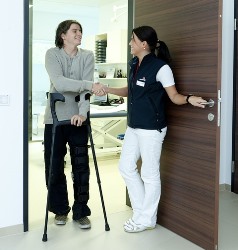How to Enroll In the Right LVN or LPN Course Near Baltimore Maryland
 Now that you have decided on a rewarding career in the field of nursing, it's important that you choose a Licensed Practical Nurse (LPN) college near Baltimore MD that will deliver the proper training. If you reside in Texas or California, then you will be searching for a Licensed Vocational Nurse (LVN) school instead. There is no distinction, aside from the names, between an LPN and an LVN. They both carry out the same job functions and work in health care facilities under the supervision of Registered Nurses (RN) or Doctors. However their responsibilities do vary depending on the state they practice in, which we will cover in the next section. When initiating their search for schools, many potential nursing students begin with the ones that are the nearest to their residences or that are the least costly. Even though cost and location are significant points to consider, they are not the only qualifications that you should base your decision on. Other concerns, for instance if the schools are accredited or have high pass rates on the licensing exam are extremely important as well. There are various other questions that you should ask prospective schools before enrolling in a LPN or LVN training program that we will talk about later in this article. But to start with, let's have a look at the role of an LPN and what is involved in the education and licensing process.
Now that you have decided on a rewarding career in the field of nursing, it's important that you choose a Licensed Practical Nurse (LPN) college near Baltimore MD that will deliver the proper training. If you reside in Texas or California, then you will be searching for a Licensed Vocational Nurse (LVN) school instead. There is no distinction, aside from the names, between an LPN and an LVN. They both carry out the same job functions and work in health care facilities under the supervision of Registered Nurses (RN) or Doctors. However their responsibilities do vary depending on the state they practice in, which we will cover in the next section. When initiating their search for schools, many potential nursing students begin with the ones that are the nearest to their residences or that are the least costly. Even though cost and location are significant points to consider, they are not the only qualifications that you should base your decision on. Other concerns, for instance if the schools are accredited or have high pass rates on the licensing exam are extremely important as well. There are various other questions that you should ask prospective schools before enrolling in a LPN or LVN training program that we will talk about later in this article. But to start with, let's have a look at the role of an LPN and what is involved in the education and licensing process.
It Only Takes a Few Minutes to Start Your LPN or LVN Career Below
What does an LPN or LVN Do?

The most basic definition for what LPNs do is that they provide routine care for the sick or injured. They work in conjunction with RNs to adhere to a care plan for each patient. RNs typically have a wider scope of practice than LPNs, such as interacting with doctors and administering medication through IVs. While an LPN’s scope of practice may be smaller than that of a registered nurse, there are still plenty of important nursing duties on their plates. LPN duties do vary somewhat by state and employer, but in general terms they provide hands-on patient care regardless of the location or employer. LPNs are responsible for a range of patient care and administrative tasks, which can include:
- Monitoring basic patient health such as vital signs and overall condition
- Changing dressings or inserting catheters
- Taking patient histories and maintaining documentation
- Assisting with tests or procedures
- Providing personal care, such as helping with bathing and toileting
- Consulting with RNs on care plans
LPNs provide care in a variety of healthcare settings. More and more patients are seeking care in or near their homes, which has resulted in many LPN jobs moving away from the hospital environment and into more specialized settings. A few of the most common places LPNs work include Baltimore MD hospitals, physician offices, nursing homes, rehabilitation centers and even correctional facilities.
LVN and LPN Certificates and Degrees
After deciding on the type of program to pursue, students need to find one approved by their state. Each state establishes its own educational requirements for LPNs and approves the schools offering credentials. Most yearlong programs are offered by junior colleges, hospitals, community colleges or technical schools, and provide the opportunity for supervised practical nursing clinical experience. In some cases applicants can get a head start by completing prerequisites in mathematics, chemistry, biology, English and psychology prior to enrolling; however, these are not always required so students should check their program’s requirements first. Admission varies by state, although applicants need at least a high school diploma or equivalent to enroll in a nursing certificate or diploma program. Additionally, some schools may require applicants to pass an entrance exam prior to acceptance to an LPN certificate program. Upon completion of an approved LPN/LVN diploma or certificate program, graduates sign up to take the National Council Licensure Examination for Practical Nurses (NCLEX-PN). All states and the District of Columbia mandate the NCLEX-PN competency exam as a core requirement to be employed as an LPN.Taking LPN and LVN Online Courses
 Enrolling in LPN schools online is becoming a more preferred way to receive training and acquire a nursing certificate or degree in Baltimore MD. Some schools will require attendance on campus for a component of the training, and virtually all programs call for a specified amount of clinical rotation hours completed in a local healthcare center. But since the rest of the training can be accessed online, this method may be a more accommodating solution to finding the free time to attend classes for many students. Concerning tuition, some online degree programs are cheaper than other on campus options. Even supplementary expenses such as for commuting and study materials can be reduced, helping to make education more easily affordable. And numerous online programs are accredited by U.S. Department of Education recognized organizations. Therefore if your work and household obligations have left you with limited time to work toward your academic goals, it could be that an online LPN program will make it more convenient to fit a degree into your busy schedule.
Enrolling in LPN schools online is becoming a more preferred way to receive training and acquire a nursing certificate or degree in Baltimore MD. Some schools will require attendance on campus for a component of the training, and virtually all programs call for a specified amount of clinical rotation hours completed in a local healthcare center. But since the rest of the training can be accessed online, this method may be a more accommodating solution to finding the free time to attend classes for many students. Concerning tuition, some online degree programs are cheaper than other on campus options. Even supplementary expenses such as for commuting and study materials can be reduced, helping to make education more easily affordable. And numerous online programs are accredited by U.S. Department of Education recognized organizations. Therefore if your work and household obligations have left you with limited time to work toward your academic goals, it could be that an online LPN program will make it more convenient to fit a degree into your busy schedule.
What to Ask LPN and LVN Schools
Now that you have decided on obtaining your LPN certificate, as well as if you will attend classes on campus or online, you can utilize the following checklist to start narrowing down your choices. As you no doubt are aware, there are numerous nursing schools and colleges near Baltimore Md as well as within Maryland and throughout the United States. So it is necessary to decrease the number of schools to select from so that you will have a workable list. As we already discussed, the site of the school and the expense of tuition are probably going to be the initial two things that you will look at. But as we also stressed, they should not be your sole qualifiers. So before making your ultimate decision, use the following questions to see how your selection compares to the other programs.
- Accreditation. It's a good idea to make sure that the certificate program in addition to the school are accredited by a U.S. Department of Education recognized accrediting organization. Aside from helping verify that you get a premium education, it may help in obtaining financial aid or student loans, which are often not offered for non-accredited schools near Baltimore Maryland.
- Reputation. Visit online rating services to see what the reviews are for each of the LPN schools you are considering. Ask the accrediting agencies for their reviews too. In addition, check with the Maryland school licensing authority to determine if there are any complaints or compliance issues. Finally, you can call some nearby Baltimore MD healthcare organizations you're interested in working for after graduation and ask what their opinions are of the schools as well.
- Internship Programs. The most effective way to acquire experience as a Licensed Practical Nurse is to work in a clinical setting. Essentially all nursing degree programs require a certain number of clinical hours be completed. Many states have minimum clinical hour prerequisites for licensing also. Check if the schools have a working relationship with nearby Baltimore MD community hospitals, clinics or labs and assist with the positioning of students in internships. Also, it's important that you choose a school that offers clinical training in the type of facility you are most interested in. For example, if you want training and experience in pediatric care, make sure that the school you choose provides adequate clinical rotation in an area Pediatric Hospital.
- Licensing Preparation. Licensing requirements for LPNs differ from state to state. In all states, a passing score is required on the National Council Licensure Examination (NCLEX-PN) along with graduation from an approved school. Some states require a specific number of clinical hours be completed, as well as the passing of additional tests. It's essential that the school you are attending not only provides an outstanding education, but also preps you to meet the minimum licensing standards for Maryland or the state where you will be practicing.
- Graduation and Job Placement Rates. Find out from the LPN schools you are considering what their graduation rates are as well as how long on average it takes students to finish their programs. A low graduation rate may be an indication that students were unhappy with the program and dropped out. It's also imperative that the schools have high job placement rates. A high rate will not only verify that the school has a favorable reputation within the Baltimore MD healthcare community, but that it also has the network of relationships to assist students gain a position.
- NCLEX Exam Pass Rate. Once you receive your certificate or diploma, you must sign up for and pass the National Council Licensure Examination for Practical Nurses (NCLEX-PN). Enrolling in a school with at least a 75% pass rate is highly preferred. Lower pass rates may indicate that a school’s program, curriculum or instructors are ineffective in teaching its students. You can find out from the school what their passing rate is for the last 5 years, or request the information from the State Board of Nursing.
Learn How to Become an LPN or LVN in Baltimore
Choose the Best Baltimore Licensed Practical Nurse Program
Enrolling in the right Licensed Practical Nurse program is perhaps the most important step to beginning a new career in the medical care field. There are numerous variables that you need to take into account when deciding on a nursing school. These factors will be prioritized differently contingent on your current career goals, lifestyle, and economic status. As we have pointed out within this content, it is essential that you enroll in an LPN school and a certificate or degree program that are both accredited and have exceptional reputations within the health care community. By using our checklist of qualifying questions, you will be able to develop a short list of schools to choose from so that you can make your ultimate selection. And with the proper degree and training, combined with your dedication and desire to succeed, you can become a Licensed Practical Nurse in Baltimore Maryland.
BALTIMORE LPN OR LVN COURSES NEAR ME | BALTIMORE LPN OR LVN TRAINING
